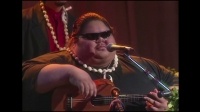iz Sheet Music
 Israel Kamakawiwoʻole
Israel KamakawiwoʻoleIsrael Kamakawiwoʻole.jpg
Kamakawiwoʻole in 1993
Background information
Birth name Israel Kaʻanoʻi Kamakawiwoʻole
Born May 20, 1959
Honolulu, Territory of Hawaii
Origin Hawaii, United States
Died June 26, 1997 (aged 38)
Honolulu, Hawaii, U.S.
Genres
Hawaii folk world reggae
Occupation(s) Singer-songwriter
Instruments
Tenor ukulele vocals
Years active 1976–1997
Labels Mountain Apple Company
Associated acts Mākaha Sons
Israel Kaʻanoʻi Kamakawiwoʻole (pronounced ; Hawaiian for "The Fearless Eyed Man"; May 20, 1959 – June 26, 1997), also called Bruddah Iz or IZ, was a Native Hawaiian singer-songwriter, musician, and Hawaiian sovereignty activist.
He achieved commercial success outside Hawaii when his album Facing Future was released in 1993. His medley of "Somewhere Over the Rainbow/What a Wonderful World" was released on his albums Ka ʻAnoʻi and Facing Future. It was subsequently featured in several films, television programs, and television commercials.
Along with his ukulele playing and incorporation of other genres, such as jazz and reggae, Kamakawiwoʻole remains influential in Hawaiian music.
 Sheet Music Port is a site for those who wants to access popular sheet music easily,
letting them download the sheet music for free for trial purposes.
It's completely free to download and try the listed sheet music, but you have to delete the files after 24 hours of trial.
Don't forget, if you like the piece of music you have just learned playing,
treat the artist with respect, and go buy the original sheet music.
Sheet Music Port is a site for those who wants to access popular sheet music easily,
letting them download the sheet music for free for trial purposes.
It's completely free to download and try the listed sheet music, but you have to delete the files after 24 hours of trial.
Don't forget, if you like the piece of music you have just learned playing,
treat the artist with respect, and go buy the original sheet music.


